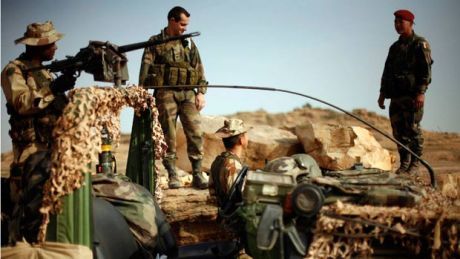News
You are here
Mali, Canada and the 'new scramble for Africa'

February 1, 2013
Canada is now a major player in the 'new scramble for Africa.' Canadian Special Forces are on the ground in Mali and a CF-17 transport plane is ferrying French troops to fight in the north of the country. Canada also has plans to build three new military bases in Senegal, Kenya and Tanzania – all to protect "Canadian interests" in the area. These developments are part of the much larger NATO presence in Africa, which has coincided with the development of AFRICOM, the US African military command.
Prime Minister Stephen Harper and NATO leaders are using the threat of "Islamists" to justify another military intervention. As we have seen over the last decade, the threat of terrorism, whether real or imagined, has become the convenient bogeyman for any and all NATO military adventures.
Resources
But as soon as we scratch the surface, it becomes apparent that the real issue with Mali and much of Africa is a scramble for its vast resources. Canadian gold mining corporations have extensive operations in Mali and other areas of the Sahara region. For the French, the main issue is uranium. France gets 70 per cent of the uranium needed for its nuclear reactors from northern Mali.
Mali is also significant because it is in the middle of a proposed pipeline designed to deliver oil from Nigeria to the Mediterranean coast. What has become a problem for the NATO countries is that the extraction of natural resources has created a backlash by local people who are opposed to the destruction of their traditional lands. Sending Western troops to the region does nothing more than compound that backlash and continue the cycle of perpetual war in the region.
Despite Harper's insistence that this is a fight against terrorism, the reality is that there are dozens of different groups operating in the Sahara that are opposed to the imperial pillage on their land and are standing up to Western interests and demands. These groups are the targets of the current war and NATO countries are not going to let them stop the plunder.
Intervention
The history of Canadian interventions in Africa is brutal and bloody. The last major Canadian deployment ended when members of the Airborne Regiment tortured and murdered a Somali teenager, Shidane Arone. The federal inquiry into that murder, called the Somalia Inquiry, discovered that the Regiment was filled with white supremacists who openly displayed Nazi propaganda on their base. The Regiment was disbanded and many of the soldiers were reassigned to the Joint Task Force II or the Canadian Special forces – the same group that has been sent to Mali.
The people of Canada are already weary after a decade of war in Afghanistan, which is why Harper remains secretive about the ongoing role that Canada will play in Mali. We need to translate that war weariness into a movement to end Canada's participation in this brutal war.
From Mali to Attawapiskat
The Mali intervention is even more absurd when juxtaposed to another major issue in federal politics: the Idle No More movement. The Harper government has offered nothing to alleviate the massive poverty of First Nations people, who have mobilized tens of thousands in recent weeks, yet Harper moved without hesitation to deploy Canadian forces to Mali.
Although we don't yet know the full cost of the Mali mission, it is safe to say that the money being used for the intervention could provide the basic necessities of life denied from Indigenous people in Canada – from clean drinking water and properly heated homes to the same access to health care and education as everybody else across the country.
Furthermore, one of the foundations of Idle No More is the principled opposition to the destruction of the natural environment, whether by Canadian mining and drilling corporations or their Conservative Party backers. Harper is now spending millions to ensure that the voices of Indigenous peoples are silenced – both at home and abroad – to ensure the uninterrupted extraction of natural resources and the profit for resource multinationals.
Harper infamously claims that Canada has no history of colonialism. That statement becomes even more offensive as we witness the process of colonisation happening right before our eyes, at home and abroad. The task for all those opposed to Canada’s intervention in Mali is to deepen the connection between the anti-war movement and struggles like Idle No More, which are leading the movement against Harper’s dangerous and destructive policies, and emerging campaigns in the labour movement, which are demanding that resources be allocated to "peace and prosperity, not war and austerity."
Section:
Topics:









